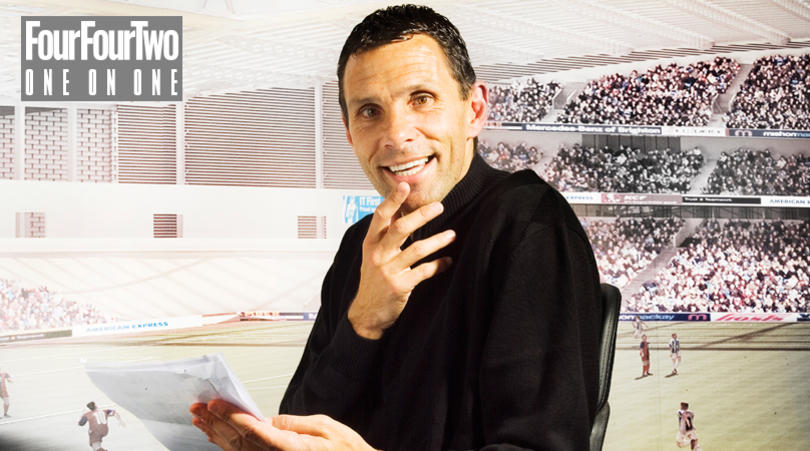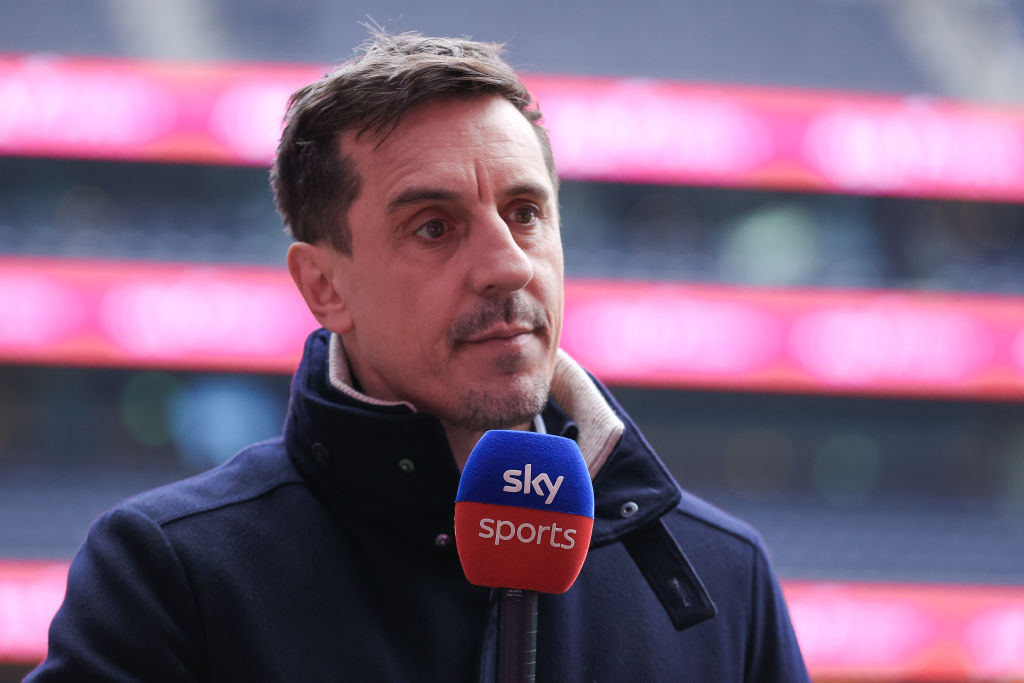The big interview: Javier Zanetti – "The free-kick against England? We'd practised it for four years!"
How did Mourinho transform Inter? Is he still fuming about Calciopoli? Why has he never changed his haircut? Martin Mazur poses your questions to Inter icon Javier Zanetti
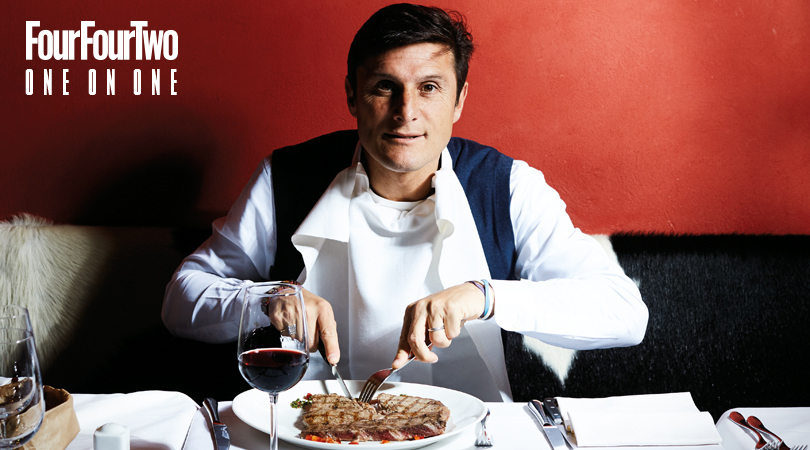
In a professional career that spanned more than two decades, Javier Zanetti has seen it all. Even since hanging up his boots in 2014, he’s been pretty busy: setting up a non-profit foundation that helps more than 1,000 kids in Argentina, becoming Inter’s vice-president as well as opening a steak restaurant in Milan.
El Gaucho has a long table saved for special guests: then-Inter boss Stefano Pioli, his assistant Walter Samuel and the rest of the Nerazzurri coaching staff are coming over for dinner – and their host naturally wants everything to be perfect.
“This will be the first time I have ever cooked a steak while in a suit,” he says while under the glare of FFT’s cameras. But before he can tuck in, it’s time for him to get stuck into your questions...
1992-93 Talleres
1993-95 Banfield
1995-2014 Inter
Hi Javier. Your restaurant sells what looks like Cornish pasties. Have you ever been to Cornwall, or England for anything other than football?
Harry Batt, via Facebook
[Surprised] Cornish pasties? You mean empanadas! Don’t tell me empanadas are from there. They’re not! [Laughs] It is the first time I’ve heard this. I’ve not been to Cornwall but now I’m curious to check it out. Empanadas are typical Argentine food! As for England, I have been there many times with my family: London, of course, but also Birmingham, Newcastle, Manchester, Liverpool.
I like to go travelling with my wife. Paula is a big Beatles fan, so when we visited Liverpool she was super excited. We went to the museum and wanted to go to the Cavern Club, but since there is a Cavern Club and a Cavern Pub in the same street, we visited both – just to make sure we didn’t make a mistake!
Who gave you your nickname ‘El Tractore?’ How did it come about?
Cristian Benta, via Facebook
It started in Argentina and was linked to my style of play: covering lots of the pitch without stopping. When I arrived in Milan, Italian journalists asked some of the journalists back home about me. They heard the nickname and adapted it to El Tractore. It remained my football nickname until I became captain, when I was rechristened Il Capitano. Nobody would call me the tractor ever again!
Before turning professional I delivered milk, setting my alarm to go off at 4am each morning, before going to school at eight and then on to training sessions in the afternoon
You used to work as a bricklayer for your father? What did that teach you about the importance of hard work? Are you still able to build a wall now?
Andre Adams, London
Those were among the best times of my life; it was one of the things I have enjoyed most. Not only because I was giving him a hand and able to be with him, but also as it was a life-changing experience to see first-hand the huge sacrifice my dad was making in order to provide for our family. It has stayed with me throughout my life and also guided me during my career. And, of course, I still know how to build a wall – I have not forgotten! If I had to build one, I could.
The day in which my dad encouraged me to be a footballer was while we were working on a wall when I was 12. Before turning professional I delivered milk, setting my alarm to go off at 4am each morning, before going to school at eight and then on to training sessions in the afternoon.
The best features, fun and footballing quizzes, straight to your inbox every week.
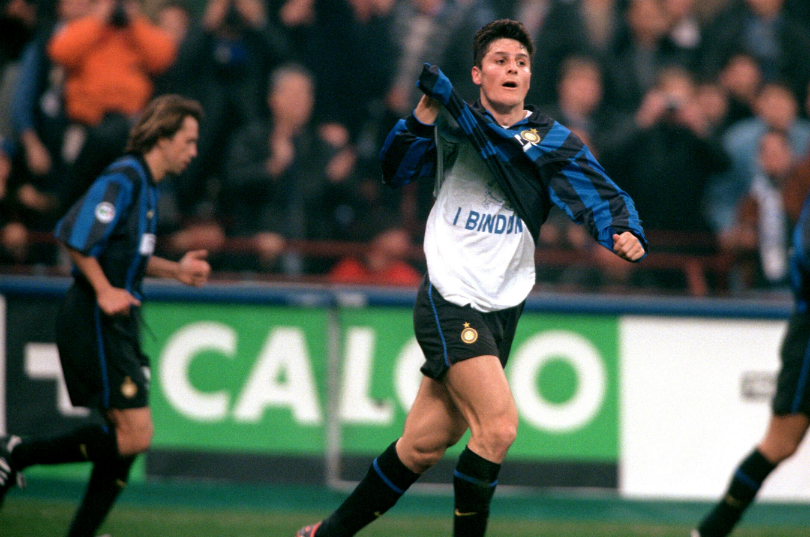
I once heard a tale that when you first arrived at Inter, you had your boots in a plastic bag and the fans waiting at the training ground did not know who you were. True story?
Ally Grier, via Facebook
The official presentation was at the Terrazzo Martini hotel. I arrived with Sebastian Rambert – a striker who’d joined from Independiente – and we were both welcomed by the president, captain Giuseppe Bergomi and some board members. It was the first time that I had ever been to Milan and there was a downpour. After that, the team headed off for our pre-season training camp in Cavalese, up in the mountains, and I went there carrying my boots in a plastic bag. Nobody knew who I was – it was another era, I was a stranger.
I passed through the fans that were waiting for their idols and moments later, when I appeared on the terrace to greet them, they realised I was the new signing. During my first season at Inter I was living alone, and back then mobile phones were new and expensive. There was a payphone two blocks from my home in Como, so I’d buy a prepaid phone card and spend hours standing there talking to [then girlfriend] Paula. The people who were left queuing as we spoke would say some rather harsh words, particularly in the winter. I’d be freezing cold, but I still kept on talking.
There’s a famous montage of your Panini stickers from 20 years with Inter (below) that highlights the fact you looked identical for the whole time. What’s your secret? And is it true you have always had the same haircut that your mother gave you?
James Grieve, via Facebook
I’ve seen them, yes, and they really are all the same! But there is no secret – just be passionate about what you do. As for the haircut, I admit my mother used to cut it into a moptop until I was 12. Then I went to a hairdresser and changed it to a side parting – which I decided to carry on with ever since.
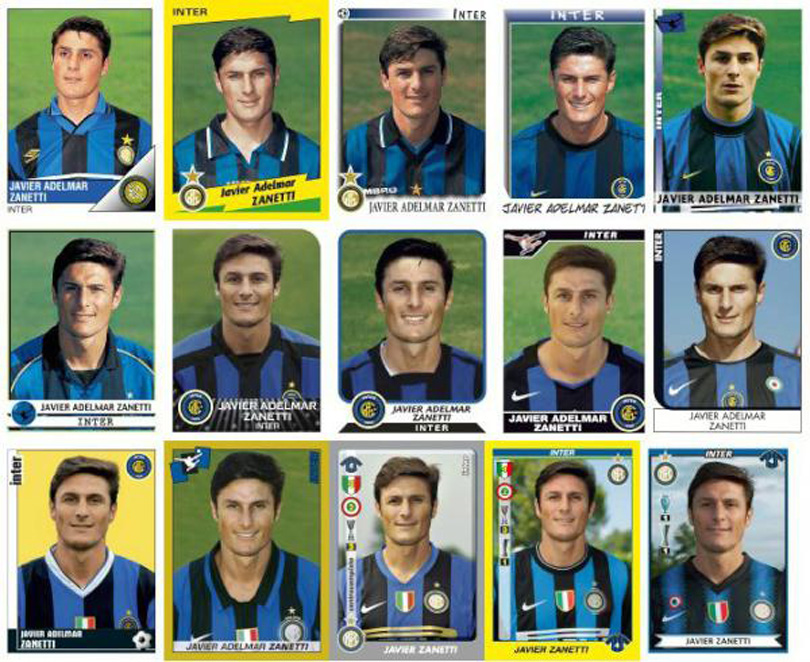
Why were you so angry when Roy Hodgson subbed you just before the shootout in the 1997 UEFA Cup Final, and what was Roy like as a coach?
Stu Greenhalgh, Merseyside
At that moment I did not accept the substitution. I had played well and didn’t think the player being sent on [Nicola Berti] would be taking a penalty. I understood it afterwards, but my reaction was in the heat of the moment. Later that evening we hugged, and I’ve still got a great relationship with Hodgson. He was a good manager, always prepared and able to take care of small but important details.
What kept you at Inter during your prime from 1999-2004 when they didn’t win anything? You must have had some offers from other clubs?
Timmay Baker, via Facebook
I was confident Inter’s moment would come. I’d speak about it with President [Massimo] Moratti and my family. Being captain, I wanted to leave an important mark on the club. Yes there were hard times, but the management showed trust in the squad being built and we worked together to achieve the goals we wanted for so long. When you sign for Inter, the club makes you think that you are part of a family, like a new son.
There were some firm rumours of Manchester United wanting to sign me in the late-90s
Did you ever have the opportunity to move to England during your career?
Matthew Newton, via Twitter
Yes, there were some firm rumours of Manchester United wanting to sign me in the late-90s. I once saw Alex Ferguson in an airport while I was in England with my wife. We talked a bit about football, but I was always centered in my idea of staying with Inter, even in those complicated years, and it would have been difficult for me to go under any circumstances. It wasn’t just Man United, there were other big clubs as well, but my love for Inter always tipped the scales.
How frustrated were you about the Calciopoli scandal and the fact other clubs were attempting to gain an unfair advantage? Did you ever suspect anything, and did anyone approach you while you were playing in Serie A?
Jon Kingson, via Facebook
We just dedicated ourselves to playing football matches and, regardless of the suspicions elsewhere, we would always end up frustrated if we hadn’t achieved the results we were looking for. Then all of the truth came out and it was a very difficult chapter for Italian football. The whole world was watching, and I just hope that nothing like it ever happens again. It’s very important to remember what happened, but my feeling now is that it’s better to leave these negative episodes in the past, and instead try to focus on the league titles we did win and the way in which we won them.
What was it like being on the pitch for the Valencia vs Inter brawl in the Champions League in 2007? What caused it? Have you ever seen anything worse than that?
Chris Fleming, via Twitter
It was a tense game at the Mestalla. Valencia went through on away goals, and after the final whistle there was clear provocation on the pitch – that was what we were reacting to. After that, everybody saw what happened: one of the Valencia substitutes [David Navarro] hit Nicolas Burdisso, breaking his nose. On the pitch, it was the worst that I have ever experienced, as it was unexpected and really shouldn’t have happened, but it’s just an anecdote now.
What’s the best story you can tell us about playing with Zlatan at Inter?
Julia Woodford, via Facebook
Oh, what an incredible guy – a great character and a player that can make the difference. His three years with us were spectacular and full of trophies, but the thing I will never forget came in training. The ball was in the air, and he raised his leg over a team-mate’s head and killed the ball with the most delicate touch you have ever seen. He studied taekwondo or something, so his movements could surprise you. If you look at his height, you would think he is not that technically gifted, but he is a different kind of player and one of a kind. We were very lucky to have him.
Inter held out with 10 men at the Camp Nou to reach the Champions League final in 2010. Was that one of the best defensive displays you have played in? Did you sense how much it meant to Jose Mourinho?
Salvo Mazzei, via Twitter
First of all, please don’t forget the great attacking display from the first leg, in which we outplayed Barcelona at the San Siro. Despite going a goal behind early on, we were so confident that we were doing our job that we ended up beating them comfortably – 3-1. The second leg was an amazing defensive performance, yes, but not because we planned it that way. It was just the way we were forced to react after Thiago Motta was sent off inside the first 30 minutes.
We showed great personality, strength, commitment and cohesion to fight for our place in the final, against an opponent that was considered the best in the world, and by some as the best in history. As a player, sometimes you get that feeling something good is about to happen; that you are capable of pulling off the impossible.
I could see the commitment of Samuel Eto’o – he was practically playing next to me as a right-back for the rest of the match, despite being a striker, because the team needed the extra cover so badly. He was willing to sacrifice himself for the team and help us defend against [Lionel] Messi and Xavi and all of the other players. That shows how much our team wanted to reach that final.
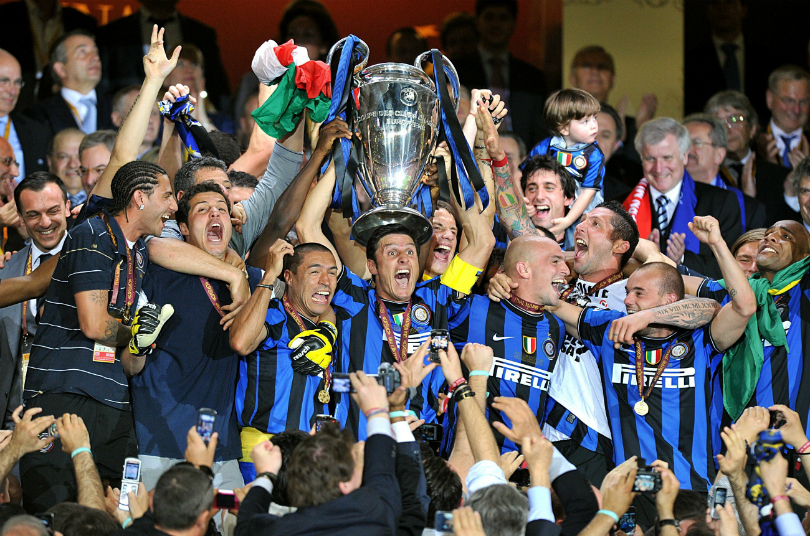
Mourinho was a controversial figure in Italy, often falling out with the press. What did the players think about that? Did he create a siege mentality that helped you to win?
Felipe Toledo, via Facebook
To us, Mourinho was always a superb manager. He was a man with a strong personality who prepared every game to the tiniest detail. He ensured that every player that went onto the pitch knew exactly what they had to do, and how they would react whichever way the match might unfold. That was his big asset. During the two seasons that Jose was in charge at Inter, the team was always incredibly well prepared.
The 2010 Champions League Final was your 700th game for Inter and you completed the Treble. Was that the best moment of your career?
Harsh Joshi, via Facebook
Yes, without a doubt. I couldn’t ask for more. But let me correct you: while it’s generally remembered as the Treble, we won five titles that year, with the Italian Super Cup and the Club World Cup on top of Serie A, the Champions League and Coppa Italia. That’s why I say that it’s the best overall moment – as the team had reached the peak.How did it feel to win the Champions League after 15 years with Inter?
Antonio Favata, via Twitter
It was a dream come true to put Inter back on the world stage – to leave our names written as Champions League winners – but especially as I knew how much the fans wanted the moment to finally come. To help make that happen was amazing. While we were still in the Bernabeu doing post-match interviews, we could see footage of fans gathering at Piazza del Duomo and we wanted to be there, too. Our flight landed at 6am and we found the San Siro packed with fans waiting for us to show them the trophy. Those are my best memories.
What was the mood in the dressing room like after the 2010 Champions League Final knowing that Mourinho was leaving? Was his departure the main reason why things took a turn for the worse the following season?
Daniel Shaw, via Twitter
Inside the dressing room it was about celebrating. The achievement had been sought after for decades, and to every one of us it was a huge relief and also a personal joy to fulfil it. Later we all thought about his decision, but you can’t think about the future straight after winning the Champions League.
Did you go for a run in between your wedding ceremony and reception? What did your wife think of that?
Cassandra Diaz, via Twitter
What can I say, she knew me! [Laughs] In Serie A we always had a break over the Christmas period, but just a week, so I would always continue my training routine. I got married on December 23, so on that day I needed to train. I did the usual wedding things as planned – after that, I went out for a quick run.
You finished off a famous free-kick routine to score against England at France 98 – how many times had you practised that one in training?
Tim Flint, Leicester
Ha! In terms of strictly answering your question, we practised it for four years, for as long as Daniel Passarella was the coach. What no one knows is that the original plan was for Ariel Ortega to shoot, not me. But as it had not worked, Passarella came up to me at the World Cup and said, “You go and stand near the end of their wall.”
I was lucky that, on the very first attempt, it went in and we got to the quarter-finals. I still remember the split-second I made the move and suddenly got the ball. Even though I had to shoot on my left foot, the strike felt perfect and I knew that it was going in.
Clear this up once and for all: did the Argentina players really taunt England from their team bus after winning on penalties and, if so, why? Was there bad blood between the two sides?
Jack Beresford, via Facebook
[Answers sternly] Not at all, absolutely no taunting. And the game was intense as it was a World Cup decider, but there was no lack of respect, neither towards the English players nor their supporters.
Does being left out of two World Cup squads in 2006 and 2010 tarnish the memories of your Argentina career? Have you spoken to Jose Pekerman or Diego Maradona about it since?
Darren Walsh, via Facebook
No, I have not talked to them about it and I wouldn’t want to, either – it is all water under the bridge now and my conscience is clear that I did everything in my power to be picked. Not only that, I was also selected a lot during the qualification games for both World Cups and then played in the opening game immediately after the two World Cups that I missed – so my desire to be there was always clear. I do not consider missing out twice to be a stain on my international career as I have got no regrets. It is all part of football and you just have to accept these things can happen and never look back – always look forward.
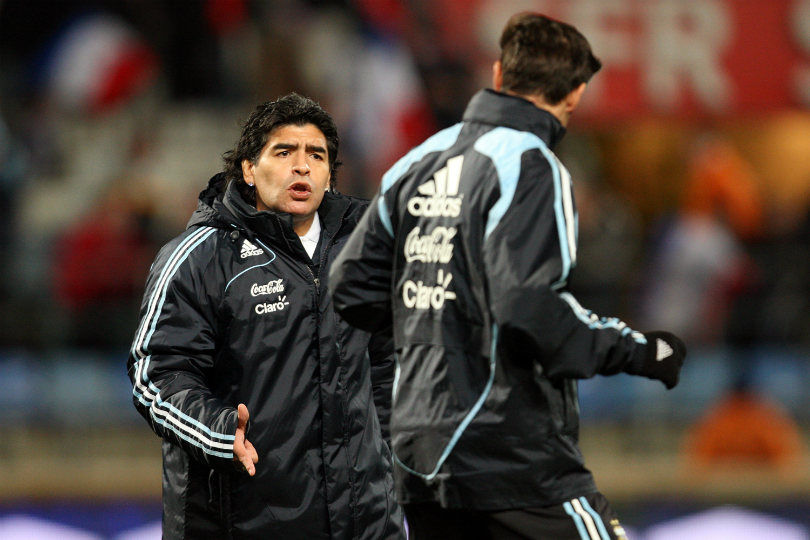
You played with guys such as Diego Simeone and Mauricio Pochettino – did you expect those two to become top coaches, are there more of your former team-mates who could do similar, and do you have ambitions of becoming a manager yourself?
Clarisa Ferreyra, via Facebook
For several years before retiring I was clear that I wanted to become what I am now – someone related to the club but not as a manager. Now that I’m vice-president at Inter I couldn’t be happier or prouder, as I feel that I am still useful to the club. But even when we were all playing, Simeone and Pochettino were like managers; they made you feel that they would eventually go that way. As for others I played with, I think another great future coach is Esteban Cambiasso. He was just like Poch and El Cholo.
If you could come out of retirement, which club would you play for? You aren’t allowed to pick Inter, sorry!
Christian VanSlyke, via Facebook
I would have to pick Independiente, as I’m a fan of them but sadly never had the opportunity to play for them. I started out in their youth academy but was released because I was not physically strong enough, as happens to many players. My idol was Ricardo Bochini and I supported them home and away during the 1983 campaign. Then the following season they lifted the Intercontinental Cup by beating Liverpool, so I’d definitely pick them.
Interview: Martin Mazur. Portrait: Mattia Zoppellaro. From the July 2017 issue of FourFourTwo. Subscribe!
 Join The Club
Join The Club





